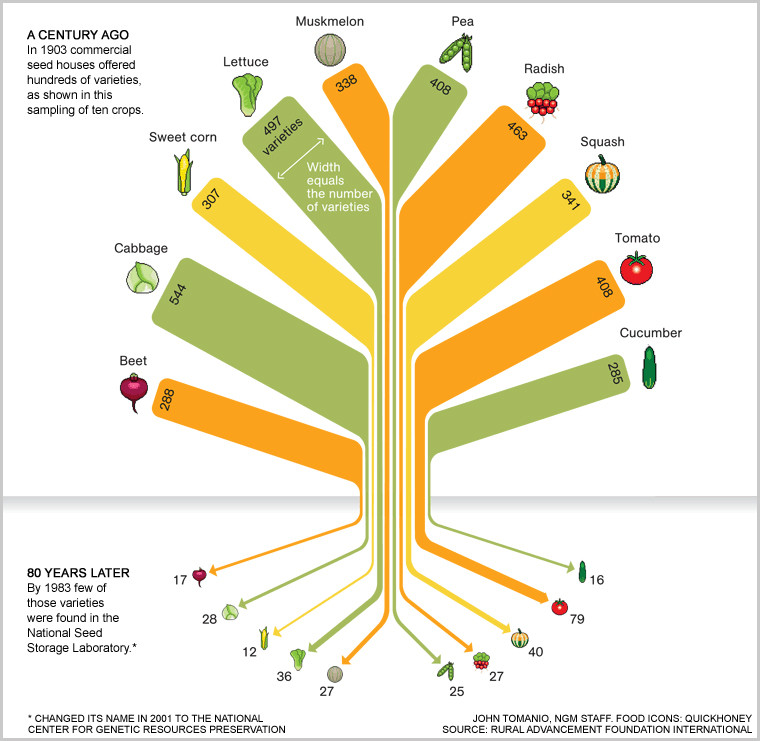 I saw the shocking infographic below the other day for the first time and couldn’t believe my eyes.
I saw the shocking infographic below the other day for the first time and couldn’t believe my eyes.
From 1903 to 1983, only 80 short years, a whopping 93% of seed varieties have been lost to industrialized agriculture.
The infographic put out by John Tomanio of National Geographic masterfully illustrates the ever dwindling variety of our food seeds in shocking manner.
In 1903, a full 500 varieties of lettuce were available from commercial seed houses. By 1983, only 36 remained.
During the same 80 year period, corn varieties plummeted from 307 to just 12.
What the infographic does not detail is the further encroachment to seed variety that genetically modified foods have caused from 1983 to the present day.
With the alarming rise of GM corn in the food supply, for example, even the paltry 12 corn varieties that remain have been largely shoved aside in favor of Monsanto’s Roundup Ready GM Corn which now doesn’t even have to be labeled in supermarkets when sold as “fresh” produce!
If the Infographic below alarms you as much as it does me, please consider participating in the urgent project Drop the Money Bomb on Monsanto.
According to the Organic Consumer’s Fund, this campaign is attempting to accomplish the following:
Between May 1 and May 26, a broad coalition of food, farm, health, public interest, and environmental groups all over the country, joined by leading organic food companies, will attempt to raise one million dollars to support the California Right to Know Genetically Engineered Food Act, a citizens’ ballot initiative, and other state GMO-labeling campaigns.
Monsanto’s quest to control the seeds of the world is a severe threat to the few natural varieties still remaining! If GM foods are labeled, GM foods will disappear due to the fact that the vast majority of consumers reject them.
I shudder to think that a similar Infographic in another few decades might primarily list only GM produce varieties!
Please help! Share the urgency of this project with those close to you and please participate yourself if at all possible!

Sarah, The Healthy Home Economist








This study had some basic errors. This was reexamined in a later better study.
http://news.uga.edu/releases/article/uga-researchers-find-no-overall-loss-of-vegetable-diversity-in-the-20th-cen/
Buy local and organic. If it is out of season, do without. Eat less meat. That will kill Monsanto.
Head Farm Steward, you make a valid point that we should all get to know our local farmers and I think you’ll find that the main thrust of traditional eating supports that wholeheartedly. However, not everyone has a local farmer that they can get to know and if they do, there are no guarantees that the local farmer grows their food ethically. Anyone growing large scale has to think about crop productivity, keeping times, ability to transport (tomatoes), etc. Heirlooms dont tend to tick enough boxes. I took this post as trying to give a wake up to a general trend rather than hard and fast facts. Their will always be opposition to the monsanto’s in any industry but is it enough. If you are a large scale producer that is able to stand against current trends I heartily, genuinely congratulate you. If you were my local, I would buy from you and encourage everyone I know to do likewise. Ever considered moving to Australia?
Wait a second. I’m in favor of evaluating what we, as farmers, are doing and of being critical of decisions we ourselves make. I am also very much in favor of retaining heirloom seeds and local strains as well as preventing/punishing genetic pollution from our neighbor’s fields (pretty easy in the case of sweet corn due to differing pollination times). But it is important that we take a moment to make sure we understand the data being presented.
“During the same 80 year period, corn varieties plummeted from 307 to just 12.”
I don’t think that’s a correct interpretation of the graph. According to the graph, 12 of the 307 that were available in 1903 were still available in 1983. There are far more than 12 varieties of sweet corn available today. Burpee’s site lists 31 options. Gurney’s lists 12. Jung lists dozens. Johnny’s Seeds lists about 40 types of sweet corn. Seed Savers has about 6. Baker Creek has about 6.
Money bomb all you want to against Monsanto but do so with the real facts. Better than a money bomb, patronize a local farmer who works to be GMO-free. In fact, free yourself from factory food by getting to know your farmer.
Wow – sad, sad sad!
I just wrote about this too, it is scary.
But this is an amazing opportunity to do something about it, this bill could really get the ball rolling! I have been trying as hard as I can to spread the word.
I agree with everyone who mentioned growing heirloom fruit & veg and saving the seeds. On an encouraging note, I have read about certain heirloom seed varieties vanishing (supposedly gone forever) suddenly being rediscovered because some diligent gardener had had grown and saved the seeds for as long as they knew how, unaware that the majority of the world’s population doesn’t do likewise. I give away as many heirloom seeds as I can to as many people as I can knowing that if mine fail there is someone else I can turn to. In my very limited experience in life it’s the ‘little guys’ like this that make the world spin true, not the greedy big corporations with their self aggrandized ‘groundbreaking’ discoveries that are going to ‘save our planet’! They not only violate our planet but the sanctity of life. One company in one country can have such far reaching consequences … all the way down here to Australia and and no doubt every corner they can stick their dirty little tentacles into. I too am eagerly awaiting the day they are dethroned and demolished!
This is so sad. I had no idea this was such a problem. Makes me want to start my own garden – and I just might!
I know this is slightly off subject and kind of a downer, but did anyone read this today?
http://www.prisonplanet.com/california-food-police-gone-wild-la-county-health-enforcers-conduct-door-to-door-raw-milk-confiscation-operations.html